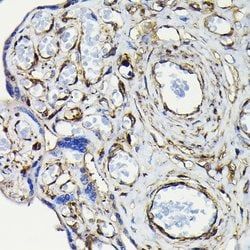INSR Polyclonal Antibody, Invitrogen™
Manufacturer: Thermo Scientific
Select a Size
| Pack Size | SKU | Availability | Price |
|---|---|---|---|
| Each of 1 | PIPA5120502-Each-of-1 | In Stock | ₹ 44,811.50 |
PIPA5120502 - Each of 1
In Stock
Quantity
1
Base Price: ₹ 44,811.50
GST (18%): ₹ 8,066.07
Total Price: ₹ 52,877.57
Antigen
INSR
Classification
Polyclonal
Conjugate
Unconjugated
Gene
INSR
Gene Alias
4932439J01Rik; CD 220; CD220; CD220 antigen; CD220 beta; CD221; D630014A15Rik; HHF 5; HHF5; IGF-I receptor; INSR; Insulin receptor; insulin receptor preproprotein; Insulin receptor subunit alpha; Insulin receptor subunit beta; IR; IR 1; IR beta; IR1; IR-1; IR-A; IR-B
Host Species
Rabbit
Purification Method
Affinity Chromatography
Regulatory Status
RUO
Gene ID (Entrez)
16337, 24954, 3643
Content And Storage
-20° C, Avoid Freeze/Thaw Cycles
Form
Liquid
Applications
Immunoprecipitation, Western Blot
Concentration
2.3 mg/mL
Formulation
PBS with 50% glycerol and 0.01% thimerosal; pH 7.3
Gene Accession No.
P06213, P15127, P15208
Gene Symbols
INSR
Immunogen
Recombinant fusion protein containing a sequence corresponding to amino acids 1281-1382 of human INSR (NP_0001992)
Quantity
100 μL
Primary or Secondary
Primary
Target Species
Human, Mouse, Rat
Product Type
Antibody
Isotype
IgG
Description
- Positive test controls include: HepG2, HeLa, Mouse brain, Mouse kidney
- The target is usually found in the following locations: Cell membrane, Single-pass type I membrane protein
- Immunogen sequence: PTFLEIVNLL KDDLHPSFPE VSFFHSEENK APESEELEME FEDMENVPLD RSSHCQREEA GGRDGGSSLG FKRSYEEHIP YTHMNGGKKN GRILTLPRSN PS INSR is a receptor tyrosine kinase
- Binding of insulin to the extracellular domain of INSR stimulates glucose uptake
- INSR and IGF-1 receptors share major structural and functional similarity
- The earliest cellular response to insulin stimulation is autophosphorylation of tyrosine in INSR
- In humans, the INSR gene is located on chromosome 19
- Defects in INSR are the cause of various insulin resistance syndromes and IGF-1R defects may also cause some forms of growth retardation.



